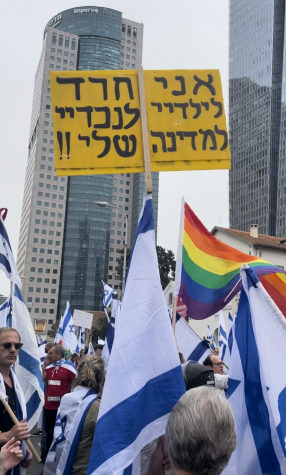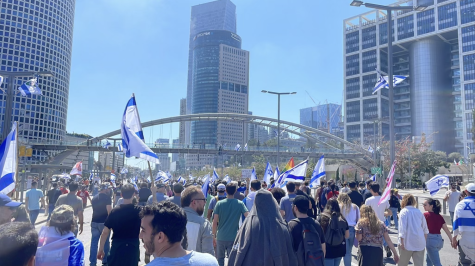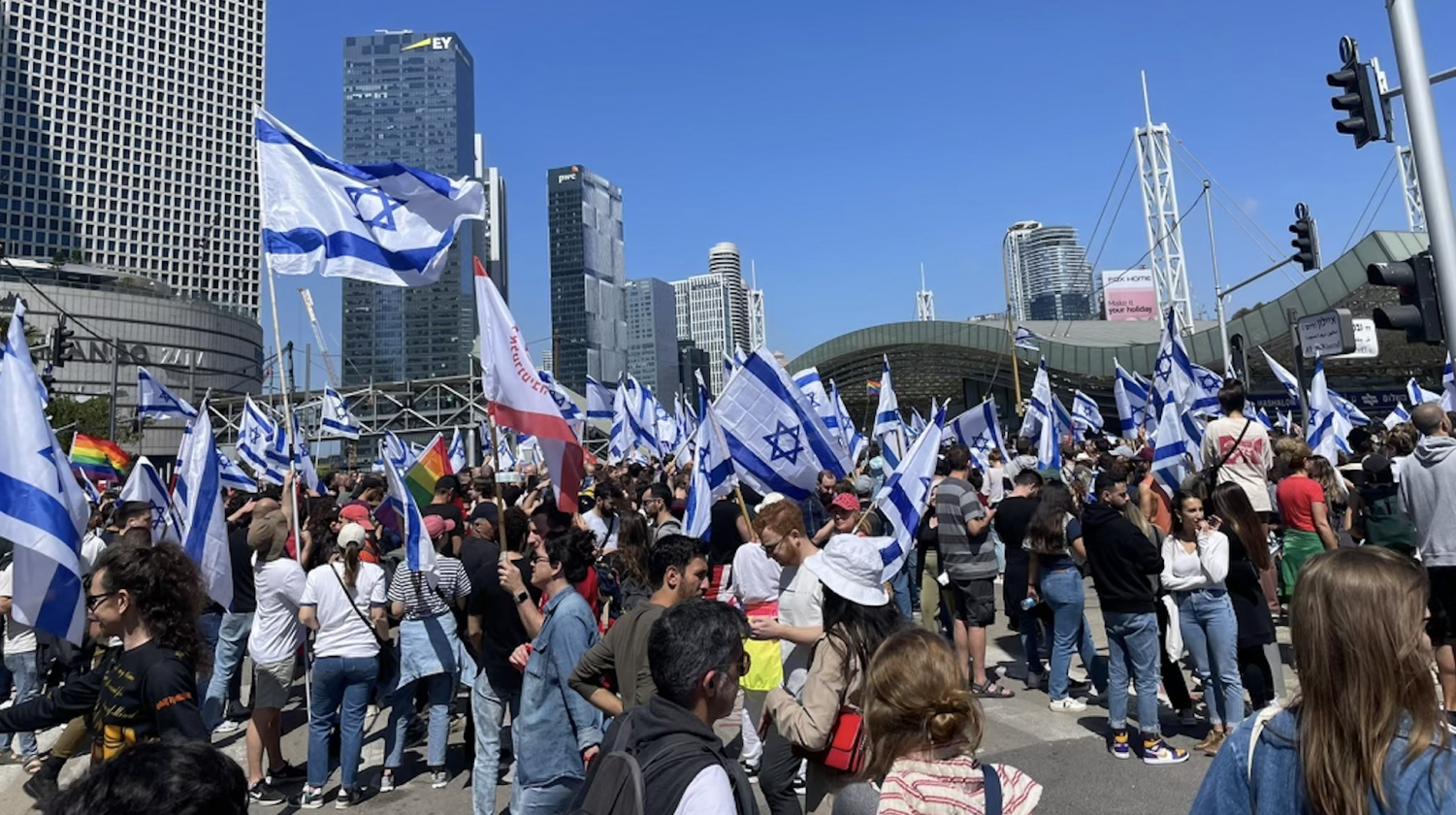Political divisions in Israel trouble students and faculty
Massive street demonstrations that led to nationwide strike in March have resumed since Pesach
May 11, 2023
For weeks, the Israeli government’s proposed judicial reforms and the protests that raged against them made headlines all over the world, including in some of the biggest news outlets in the United States.
But at Shalhevet, where Jewish History and Israel Education are required courses, when asked to voice their opinion on Israel’s government crisis nearly all of 20 people surveyed replied that they did not think they were the best person to ask.
During the week of Yom Haatzmaut – Israel independence day, this year marking its 75th birthday – the Boiling Point asked both students and faculty to share their opinions on Israel’s political crisis, which started when the current government, led by newly re-elected Prime Minister Benjamin Netanyahu, proposed changes that would prevent the Israeli Supreme Court from overruling laws it found unreasonable.
The reforms would also allow whoever is in power at any particular time to select who serves on the committee that chooses members of the court. For now, the reforms have been put on hold while Netanyahu looks for a solution that will avoid further protest.
Supporters of the reforms say they are needed because the Supreme Court does not represent all demographics of Israeli society, and because it holds too much power. Justices are chosen by the Judicial Selection Committee of Israel, and because most of the nine members of the committee are not elected officials, the Supreme Court is perceived by many as not representing Israel’s diverse population.
At the present time, the Supreme Court can also override any laws the Knesset – Israel’s parliament – passes that it deems unreasonable.
While all of the eight faculty members surveyed ultimately gave an answer, most did not take a political stance; rather, they shared multiple perspectives and said both views had validity.
“I don’t think I’m qualified enough to answer that question,” said Judaic Studies teacher Rabbi Ari Schwarzberg. “To give you a proper answer, I’d have to understand all the nuances of it much better.”

Eight students did not want to respond at all when asked for their opinion on the proposed reforms, either because they did not know enough, or because they knew enough but could not provide an opinion one way or the other.
“I don’t know enough about it,” said a sophomore who had asked not to be interviewed.
But two students – a freshman and a senior – and one teacher did take strong stances against the proposed reforms.
“I think that they would take away a lot of the rights of the people,” said freshman Lev Fishman. “It would allow the Knesset to do whatever they want with a simple majority.”
Senior Dani Kunin agreed, but said the decision should be up to the people of Israel.
“I feel like as an American it’s definitely wrong,” said Dani of the proposed change. “I feel like there should be checks and balances in government. But obviously that’s coming from my own American perspective.”
Out of the 12 students surveyed, only four were willing to talk, including Lev and Dani.
Judaic Studies teacher Dr. Sheila Keiter was the only faculty member surveyed who took a political stance. She thinks there are two sides to the issue, but that the current proposed reforms would weaken the independence of the judiciary too much.
“The current status of the Israeli Supreme Court does have real issues,” Dr. Keiter said, starting with the Judicial Selection Committee, which is not an elected body.
“There’s no real say of the people,” she said. “So that does require some kind of reform that most people would probably agree with.”
On the other hand, Dr. Keiter said the proposed reforms are an effort by Prime Minister Netanyahu’s government coalition to gain more power. She said that if the proposed judicial changes became law, it would pull the Supreme Court into partisan politics.
“Then it becomes completely the [ruling] party who decides who’s sitting on the court,” she said, “and I don’t think that’s good for an independent judiciary – to be a political position.”
The entire argument is possible because when the country was formed, its first government body did not establish a written constitution. According to The Jerusalem Post, the Knesset at the time of Israel’s establishment felt that a constitution was not necessary for a democratic state, and that it could not be written unless more Jews moved to Israel and were involved in the constitution’s creation.
Also according to The Jerusalem Post, Israel’s first prime minister, David Ben-Gurion, was opposed to the idea of a constitution because he thought that Israel would become divided if its government had to debate and discuss the nature of the new country.
Instead, in 1950 a set of “Basic Laws” — laws that dealt with the structure of the Israeli government — were established, which the government at that time intended to eventually be legislated into a constitution. The Basic Laws have yet to be compiled into a constitution however, and as of now, they can be changed and revised like any other law in Israel.
“I think Israel has a real constitutional crisis on its hands,” Dr. Keiter said, “in the sense that it never had a constitution, and it kind of needs one.”
The rest of the students and faculty surveyed responded by lamenting the divisions in Israeli society.
Hundreds of thousands of Israelis protested against the proposed reforms for months, and on March 27, a countrywide strike was announced by the country’s largest trade union – a strike that shut down much of the country, including schools, shops and transportation. Reserve pilots in the Israeli Defense Force threatened to strike as well.
Ben-Gurion Airport halted all takeoffs that Monday, and workers at the country’s largest port in Haifa ceased work as well in support of the strike, which was called after Mr. Nentanyahu fired Israel’s defense minister, Yoav Gallant. Minister. Gallant was the first member of Netanyahu’s cabinet to call for a pause to the reforms.
Israelis within Israel have been sharply divided about the proposal, and the country’s overseas representatives were as well. For example, according to CNN, some Israeli embassies in the United States and in Europe closed for the strike, as many of their workers and diplomats stayed home. Officials at the Israeli Consulate stayed at their posts, however.
Interviewed on Yom Haatzmaut, Rabbi Schwarzberg tried to put a good spin on it.
“If I zoom out, it’s beautiful – honestly it’s amazing,” Rabbi Schwarzberg said.
“Nobody ever wants to be part of divisiveness when divisiveness is happening,” he said, “but if you look at the larger picture, to me this is a reflection of Yiddishkeit, of Zionism, of people being passionate about what this country stands for, and it matters so deeply to everyone that they’re willing to say something about it.”
In fact, everyone interviewed at school agreed – and was willing to say – that too much division in Israel is not good for the country.
Rabbi David Stein, Director of Judaic Studies, said that the level of division in Israel is healthy and a sign of a strong society – so far.
“What I fear is these tensions escalating,” said Rabbi Stein. “But I think it’s been 20 straight weeks of, or however long the protestors have been organizing, every Saturday night,massive protest. And I think one of the remarkable things is that this is being done by both sides – not out of animosity, but it’s being done by people who really care about Medinat Yisrael, and want to have the best government possible for Medinat Yisrael.”
Senior Talia Schapira and freshman Elisha Fishman agreed with Rabbi Stein.
“It’s really scary when even our own nation is divided,”said Talia.
Echoing Talia’s message, Elisha said unity is extremely important.
“As a Jewish state we kind of have to stay together,” said Elisha.

One of Rabbi Stein’s classes is SAS Israel Education, and part of its normal curriculum is about the establishment of the Israeli government. In March, students were given an assignment in which they had to describe both sides of the controversy and then give their own perspective.
Junior Sami Brous-Light wrote of the proposed reforms: “If this proposal is passed, it will not help Israel in any way. But rather will be devastating for Israel’s democracy.”
Her classmate Mordechai Heller titled his paper “The Constitutional Dilemma.”
“Israel should not pass the judicial reforms,” wrote Mordechai, “to ensure that tyranny amongst the majority does not occur within the Knesset and that Basic Laws and human rights are protected.
“The judicial reforms would take power away from the judicial branch, which safeguards and ensures governmental power is handled responsibly,” he continued.
Keira Deutsch argued that only elected officials should have such authority, and since the Supreme Court is not an elected body, reforms are needed.
“Future justices…could easily use that power for purposes other than the protection of human rights,” wrote Keira. “Including pushing a particular ideological agenda that may be contrary to what the people of Israel actually want.”
But she added that Israel needs to have a democratic system whoever is serving in the Supreme Court or the Knesset at that time.
“We need to consider situations where justices may not act responsibly with their power,” Keira wrote. “[The proposed] judicial reform helps ensure that there are appropriate limits placed on the Supreme Court that will protect against potential abuses of power in the future.”
On the evening of March 27 – the day of the beginning of Israel’s nationwide strike – Prime Minister Netanyahu paused his plans to overhaul the judiciary until after the Knesset resumed after Pesach. The Knesset would then work on reaching a compromise, he said, so the country would not descend into upheaval again.
After the announcement, the strike was called off, But the protests started up again April 22, and have continued since then — even though political teams for and against the proposed reforms started discussing them again at Israeli President Isaac Herzog’s residence over chol hamoed. Media reports said the Knesset’s break ended April 30, and that on May 8 the body was still negotiating.
At Shalhevet, too, the hope for a solution is something that everyone agreed upon.
“I just want peace between the two sides,” said Hebrew teacher Ms. Michal Davis-Bryski. “Ahavat Yisrael” – loving Israel – “that’s the most important thing. We need to love each other.”
Rabbi Schwarzberg pinned his hopes on the Shmuel Aleph (1 Samuel), Chapter 15 verse 29.
“Netzach Yisrael lo yeshaker,” Rabbi Schwarzberg said. He translated it himself: “The eternality of the Jewish people,” he said. “It’s not going away.”
